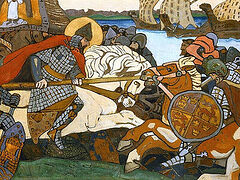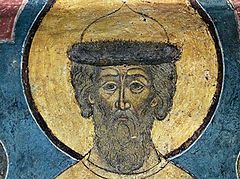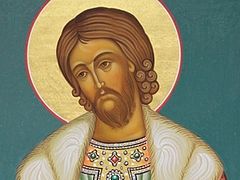Tomorrow, November 3 / December 6, we celebrate the memory of Holy Right Believing Prince Alexander Nevsky, in the monastic schema, Alexei. In the coming year we will be hearing much more about this great saint of the Russian Church, because May 13, 2021 marks the 800th anniversary of his birthday.
 M. Nesterov. Prince Alexander Nevsky The name of right-believing Prince Alexander Nevsky is written into secular history, first of all in the bright colors of military victories that played a large role in Russia’s further development. However, beside his military valor, patriotism, and courageous self-denial there is the podvig of a saint, and something that can’t be fathomed by secular logic alone…
M. Nesterov. Prince Alexander Nevsky The name of right-believing Prince Alexander Nevsky is written into secular history, first of all in the bright colors of military victories that played a large role in Russia’s further development. However, beside his military valor, patriotism, and courageous self-denial there is the podvig of a saint, and something that can’t be fathomed by secular logic alone…
In the Gospel of John, the Savior says to His disciples, Peace I leave with you, my peace I give unto you: not as the world giveth, give I unto you. Let not your heart be troubled, neither let it be afraid (Jn. 14:27). In these words, we hear the testimony of God Himself about how He leaves peace as an inheritance to those who believe in Him. How hard it is for us in difficult times to understand this word about peace. It is even harder to combine it with the podvig of the famous commander and valorous warrior, who struck fear in the hearts of the enemies with his courage.
Nevertheless, there is a connection, and not an accidental one. It is worth taking a look at it. It is lost when people try to find Christ in places where He does not intend to leave testimony of Himself. After all, the Savior said to the man who asked Him to be the judge in an inheritance dispute with his brother: Who made me a judge or a divider over you? (Lk. 12:14). And this is a serious tragedy of our times. The person who doesn’t find God in a world that is comfortable and understandable to him, who doesn’t receive an answer to his own demands on the Creator, tries to find an acceptable imitation of eternity for himself. In Orthodoxy, it’s quite the other way around. Here we don’t try to fit God into our own idea of eternity; here we honestly admit that God is not where people remember Him only in order to reach their egotistical goals. Here it is all too obvious: You are either with Christ, or with those who have learned how to get everything they want by their own means. This is how we should look at the world that the Savior has left us. God’s peace is Christ’s victory, while human peace is a “balance of power.” The first is eternal, the second is too inconstant…
“Thou didst teach us by thy wise deeds that we can take nothing out of this world to where nothing can be taken,” as we hear in a hymn to Right-Believing Prince Alexander, and we understand that this is not the honor given to a military leader whose whole strength consists in the fortitude of his subordinates and the strength of his weapons. “Brightly adorned with piety and faith, like a pious scepter-bearer, thou wast likewise an outstanding and greatly famed warrior of the Most Holy Trinity…,” as the Church describes the saint ever more clearly. And in this image, at the fore is not victory over an enemy, but the right believing prince’s motivation, not to seek the establishment of a temporary balance of power, but to take the path of labors and great efforts to defend the faith of his fathers. This was not a war for the sake of political interests, not the satisfaction of vain ambitions, but a true act of faith. In this is the Right Believing Prince’s podvig. Under the difficult circumstances of the times, he was able to refuse to play political games and follow the call of a faithful heart, which demanded decisive actions in defense of Orthodoxy. Holy Prince Alexander chose to labor in the name of Christ’s victory instead of subtle diplomacy for the sake of a tentative peace. The peace he acquired was true peace, although clothed externally in the clamor of battle.
And this is a great example for our lives. We are not talking here about the problems of global politics. We are talking about more important things—about the salvation of a specific soul. In this sense, the podvig of Right Believing Prince Alexander comes into our lives as a very specific question: Are you for the victory of Christ, or is a “balance of power” more to your liking?
 M.V. Nestorov. “The Repose of Alexander Nevsky”.
M.V. Nestorov. “The Repose of Alexander Nevsky”.
The peace that faith brings into our lives is impossible to understand for someone who does not seek Christ. This peace is very far from any idea of an outwardly tranquil course of life and the comfort of a fickle reality that people far from the faith usually imagine when they think of peace. If God’s peace is the victory of Christ, then naturally its appearance in our lives must necessarily be preceded by a particular struggle. There is no compromise here. It’s all much too important. The meaning of peace in Christ is not in the acquisition of tranquility but in the understanding of what is truly important and what is of secondary importance. Here, people take for peace that very “balance of power”, which is able to smooth over the rough edges of outward life. Here everything is hidden behind a mask of tranquility and comfort. The only thing they forget to say about it is that to them, Christ is not needed…



